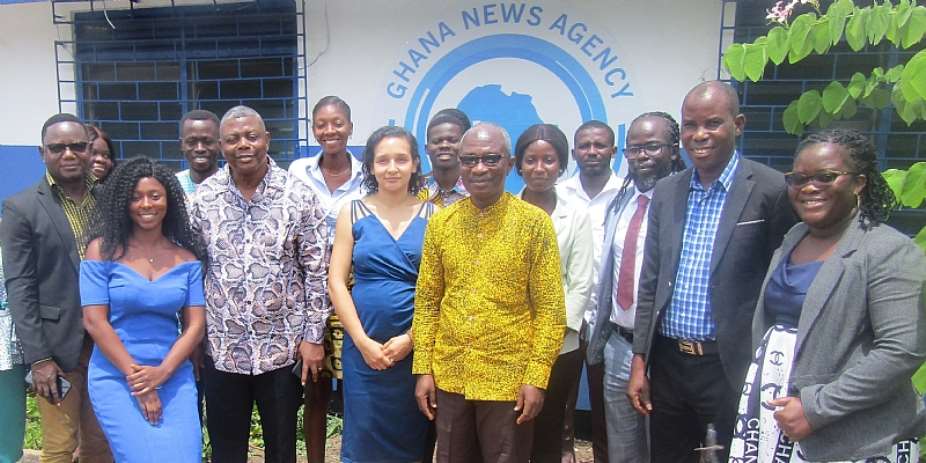Mr. Richard A. Quayson, Deputy Commissioner, Commission on Human Rights and Administrative Justice (CHRAJ) at the weekend called on Ghanaians to collectively move away from the talk, talk, and act on issues of corruption.
“We must report incidents of corruption from our workplaces, our communities, and within the public establishment. It is only when we all open our eyes wide and other sense against corrupt practices only then can we fight it,” he said.
“CHRAJ’s doors are open wide for anybody who smells corrupt practices at the workplace or any public institution to walk in and report, we will protect your identity, and conduct our own investigations,” Mr. Quayson has stated.
Mr. Quayson stated at the 17th Monthly Stakeholders Engagement and Workers’ appreciation day seminar organized by the Ghana News Agency's Tema Regional Office, which was monitored by the Communication for Development and Advocacy Consult (CDA Consult) in Tema.
The GNA Tema event also aimed at providing a platform for both state and non-state organizations to address national issues to enhance development as well as serve as a motivational mechanism to recognize the editorial contribution of reporters toward national development in general, growth and promotion of the Tema GNA as the industrial news hub.
Mr Quayson who spoke on the topic: “Is the fight against corruption a mirage or reality, the perspective of CHRAJ,” explained that “it is time to infuse fearless honesty into the national behaviour and ignite collective sustained action with coordinated efforts, as well as the judicious application of resources of stakeholders to combat corruption”.
The CHRAJ Deputy Commissioner also said amidst growing perceptions of corruption, the public has become increasingly cynical about the official commitment to effectively tackle the menace.
“Confidence in the integrity of public office is fast eroding due to inadequate appreciation of the complex mix of factors implicated in corruption; lack of public participation in the development and implementation of the anti-corruption measures; and failure to foster local ownership in the formulation and implementation of the various strategies.
“Lack of effective and sustained coordination in the implementation of anti-corruption measures; and lackadaisical government commitment to, and limited support for, the implementation of anti-corruption strategies,” he noted.
Mr. Quayson noted that corruption in Ghana is largely nurtured and influenced by the patrimonial character of the society where informal relations, family connections and social reciprocity are reflected in levels of favouritism, cronyism and nepotism.
“The patronage system also fundamentally influences the formal system and creates contradictions between how institutions are intended to operate in principle and how informal practices supplant formal structures in reality.
“As a result, public administration and political competition often appear to be driven more by personal ties than formal rules”.
Mr Francis Ameyibor, GNA Tema Regional Manager suggested that Civil Society Organisations (CSOs), religious bodies, professional groups, traditional authorities, gender-based groups and other interest groups must stand-up and fight for mother Ghana at the next general election.
He said: “It is time CSOs strategized together and picked one constituency in each of the 16 regions and sponsor someone to contest for the 2024 parliamentary election as an independent candidate.
“They will then use their advocacy and influence in the grassroots to market such a candidate. They should stop building the capacity of political parties for elections and put that knowledge into practice.
“The various labour unions and associations Ghana National Association of Teachers, UTAG, Ghana Trade Union Congress, Ghana Journalists Association, Ghana Federation of Labour among others, should identify at least ten constituencies each across the country and sponsor independent candidates to get into Parliament to fight for labour.
“We must begin to move away from labour unrests in the streets and take the fight to Parliament, where major decisions are taken”.
Mr Ameyibor said other professional bodies must also consider picking just one Constituency and equally sponsor an independent candidate for the next elections; “If well-coordinated they must not contest the same Parliamentary seat, but spread across the 275 Constituencies”.
He said: “We must begin to redefine Constituencies not only in terms of geographical location, but it should also cover specific national interest groups, Labour, academia, legal practitioners, business community, health workers, gender, media and communication practitioners, CSOs, and the informal sector must begin to identify and nurture constituencies for Election 2024”.
-CDA Consult II Contributor





 Dumsor: Don't rush to demand timetable; the problem may be temporary — Atik Moha...
Dumsor: Don't rush to demand timetable; the problem may be temporary — Atik Moha...
 Space X Starlink’s satellite broadband approved in Ghana — NCA
Space X Starlink’s satellite broadband approved in Ghana — NCA
 2024 election will be decided on the grounds of the economy; choice of running m...
2024 election will be decided on the grounds of the economy; choice of running m...
 Dumsor: We're demanding less; just give us a timetable — Kwesi Pratt to ECG
Dumsor: We're demanding less; just give us a timetable — Kwesi Pratt to ECG
 Do I have to apologise for doing my security work, I won’t – Simon Osei-Mensah r...
Do I have to apologise for doing my security work, I won’t – Simon Osei-Mensah r...
 All my businesses have collapsed under Akufo-Addo — NDC Central regional chair
All my businesses have collapsed under Akufo-Addo — NDC Central regional chair
 Military, Prison Officers clash in Bawku, three injured
Military, Prison Officers clash in Bawku, three injured
 GRA-SML contract: MFWA files RTI request demanding KPMG report
GRA-SML contract: MFWA files RTI request demanding KPMG report
 Court threatens to call second accused to testify if NDC's Ofosu Ampofo fails to...
Court threatens to call second accused to testify if NDC's Ofosu Ampofo fails to...
 Family accuses hospital of medical negligence, extortion in death of 17-year-old...
Family accuses hospital of medical negligence, extortion in death of 17-year-old...
